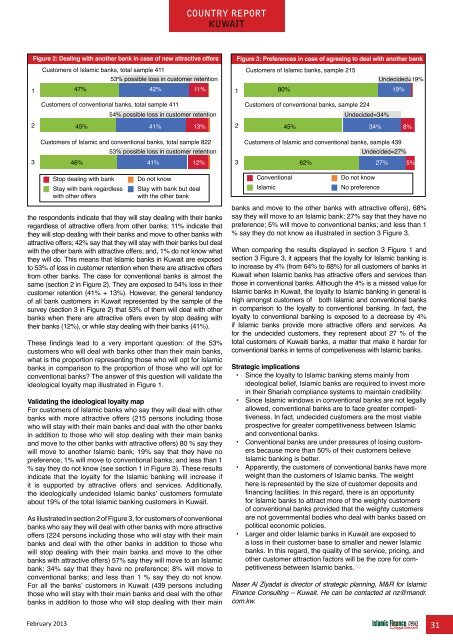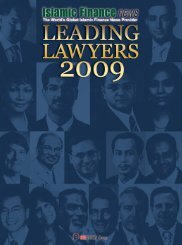View PDF Edition - Islamic Finance News
View PDF Edition - Islamic Finance News
View PDF Edition - Islamic Finance News
You also want an ePaper? Increase the reach of your titles
YUMPU automatically turns print PDFs into web optimized ePapers that Google loves.
country report<br />
kuwait<br />
Figure 2: Dealing with another bank in case of new attractive offers<br />
Customers of <strong>Islamic</strong> banks, total sample 411<br />
53% possible loss in customer retention<br />
1<br />
47% 42% 11%<br />
Figure 3: Preferences in case of agreeing to deal with another bank<br />
Customers of <strong>Islamic</strong> banks, sample 215<br />
Undecided=19%<br />
1<br />
80% 19%<br />
Customers of conventional banks, total sample 411<br />
54% possible loss in customer retention<br />
Customers of conventional banks, sample 224<br />
Undecided=34%<br />
2<br />
45% 41% 13%<br />
2<br />
45% 34% 8%<br />
Customers of <strong>Islamic</strong> and conventional banks, total sample 822<br />
53% possible loss in customer retention<br />
Customers of <strong>Islamic</strong> and conventional banks, sample 439<br />
Undecided=27%<br />
3<br />
46% 41% 12%<br />
3<br />
62% 27% 5%<br />
Stop dealing with bank<br />
Stay with bank regardless<br />
with other offers<br />
Do not know<br />
Stay with bank but deal<br />
with the other bank<br />
the respondents indicate that they will stay dealing with their banks<br />
regardless of attractive offers from other banks; 11% indicate that<br />
they will stop dealing with their banks and move to other banks with<br />
attractive offers; 42% say that they will stay with their banks but deal<br />
with the other bank with attractive offers; and, 1% do not know what<br />
they will do. This means that <strong>Islamic</strong> banks in Kuwait are exposed<br />
to 53% of loss in customer retention when there are attractive offers<br />
from other banks. The case for conventional banks is almost the<br />
same (section 2 in Figure 2). They are exposed to 54% loss in their<br />
customer retention (41% + 13%). However, the general tendency<br />
of all bank customers in Kuwait represented by the sample of the<br />
survey (section 3 in Figure 2) that 53% of them will deal with other<br />
banks when there are attractive offers even by stop dealing with<br />
their banks (12%), or while stay dealing with their banks (41%).<br />
These findings lead to a very important question: of the 53%<br />
customers who will deal with banks other than their main banks,<br />
what is the proportion representing those who will opt for <strong>Islamic</strong><br />
banks in comparison to the proportion of those who will opt for<br />
conventional banks? The answer of this question will validate the<br />
ideological loyalty map illustrated in Figure 1.<br />
Validating the ideological loyalty map<br />
For customers of <strong>Islamic</strong> banks who say they will deal with other<br />
banks with more attractive offers (215 persons including those<br />
who will stay with their main banks and deal with the other banks<br />
in addition to those who will stop dealing with their main banks<br />
and move to the other banks with attractive offers) 80 % say they<br />
will move to another <strong>Islamic</strong> bank; 19% say that they have no<br />
preference; 1% will move to conventional banks; and less than 1<br />
% say they do not know (see section 1 in Figure 3). These results<br />
indicate that the loyalty for the <strong>Islamic</strong> banking will increase if<br />
it is supported by attractive offers and services. Additionally,<br />
the ideologically undecided <strong>Islamic</strong> banks’ customers formulate<br />
about 19% of the total <strong>Islamic</strong> banking customers in Kuwait.<br />
As illustrated in section 2 of Figure 3, for customers of conventional<br />
banks who say they will deal with other banks with more attractive<br />
offers (224 persons including those who will stay with their main<br />
banks and deal with the other banks in addition to those who<br />
will stop dealing with their main banks and move to the other<br />
banks with attractive offers) 57% say they will move to an <strong>Islamic</strong><br />
bank; 34% say that they have no preference; 8% will move to<br />
conventional banks; and less than 1 % say they do not know.<br />
For all the banks’ customers in Kuwait (439 persons including<br />
those who will stay with their main banks and deal with the other<br />
banks in addition to those who will stop dealing with their main<br />
Conventional<br />
<strong>Islamic</strong><br />
banks and move to the other banks with attractive offers), 68%<br />
say they will move to an <strong>Islamic</strong> bank; 27% say that they have no<br />
preference; 5% will move to conventional banks; and less than 1<br />
% say they do not know as illustrated in section 3 Figure 3.<br />
When comparing the results displayed in section 3 Figure 1 and<br />
section 3 Figure 3, it appears that the loyalty for <strong>Islamic</strong> banking is<br />
to increase by 4% (from 64% to 68%) for all customers of banks in<br />
Kuwait when <strong>Islamic</strong> banks has attractive offers and services than<br />
those in conventional banks. Although the 4% is a missed value for<br />
<strong>Islamic</strong> banks in Kuwait, the loyalty to <strong>Islamic</strong> banking in general is<br />
high amongst customers of both <strong>Islamic</strong> and conventional banks<br />
in comparison to the loyalty to conventional banking. In fact, the<br />
loyalty to conventional banking is exposed to a decrease by 4%<br />
if <strong>Islamic</strong> banks provide more attractive offers and services. As<br />
for the undecided customers, they represent about 27 % of the<br />
total customers of Kuwaiti banks, a matter that make it harder for<br />
conventional banks in terms of competiveness with <strong>Islamic</strong> banks.<br />
Strategic implications<br />
• Since the loyalty to <strong>Islamic</strong> banking stems mainly from<br />
ideological belief, <strong>Islamic</strong> banks are required to invest more<br />
in their Shariah compliance systems to maintain credibility.<br />
• Since <strong>Islamic</strong> windows in conventional banks are not legally<br />
allowed, conventional banks are to face greater competitiveness.<br />
In fact, undecided customers are the most viable<br />
prospective for greater competitiveness between <strong>Islamic</strong><br />
and conventional banks.<br />
• Conventional banks are under pressures of losing customers<br />
because more than 50% of their customers believe<br />
<strong>Islamic</strong> banking is better.<br />
• Apparently, the customers of conventional banks have more<br />
weight than the customers of <strong>Islamic</strong> banks. The weight<br />
here is represented by the size of customer deposits and<br />
financing facilities. In this regard, there is an opportunity<br />
for <strong>Islamic</strong> banks to attract more of the weighty customers<br />
of conventional banks provided that the weighty customers<br />
are not governmental bodies who deal with banks based on<br />
political economic policies.<br />
• Larger and older <strong>Islamic</strong> banks in Kuwait are exposed to<br />
a loss in their customer base to smaller and newer <strong>Islamic</strong><br />
banks. In this regard, the quality of the service, pricing, and<br />
other customer attraction factors will be the core for competitiveness<br />
between <strong>Islamic</strong><br />
consulting www.<strong>Islamic</strong><strong>Finance</strong>Consulting.com<br />
www.<strong>Islamic</strong><strong>Finance</strong>Events.com<br />
banks.<br />
www.<strong>Islamic</strong><strong>Finance</strong><strong>News</strong>.com<br />
www.<strong>Islamic</strong><strong>Finance</strong>Training.com<br />
www.MIFforum.com<br />
www.MIFmonthly.com<br />
www.MIFtraining.com<br />
www.REDmoneyBooks.com<br />
Do not know<br />
No preference<br />
Naser Al Ziyadat is director of strategic planning, M&R for <strong>Islamic</strong><br />
<strong>Finance</strong> Consulting – Kuwait. He can be contacted at nz@mandr.<br />
com.kw.<br />
February 2013 31
















